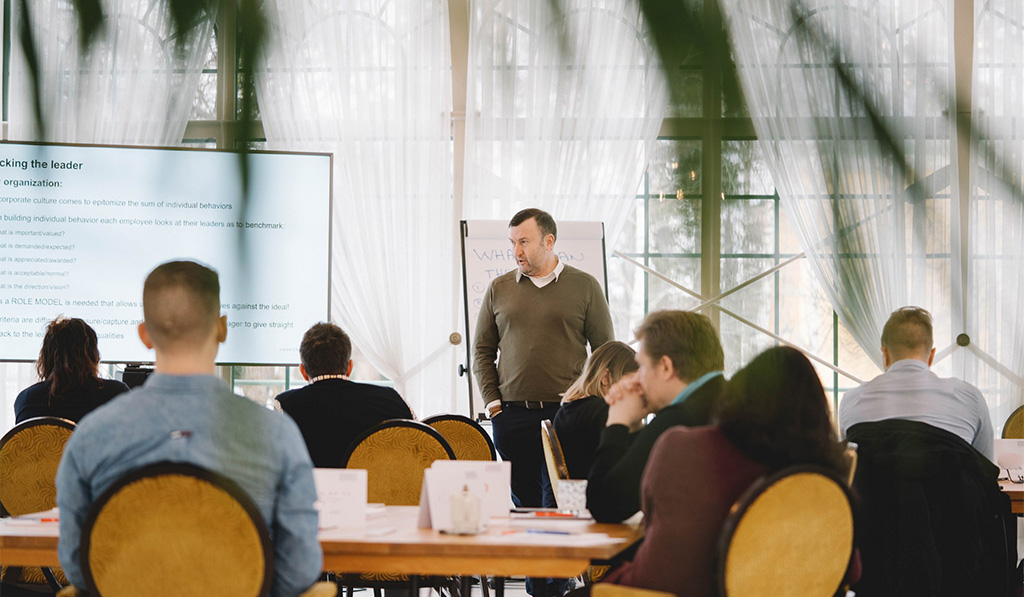
6 min read
We learn from experience, which helps us see patterns and build mental models. Sometimes it takes repeated experience to establish the pattern and validate the model.
Other things you only do once: When presenting with a wireless microphone, do not leave it on when taking a bathroom break. In many cases it is vastly more efficient to learn from collectively accumulated experiences (what the machine learning people call transfer learning). The more generally applicable a model is, the more valuable it potentially is – and thus, universal learnings evolve into truisms and clichés.
The purpose of science, and education, and science-based executive education, is to learn from shared experiences, preferably before they have reached cliché status. The most valuable learnings are often the ones that seem counter-intuitive at first, and self-evident after. This indicates that they significantly update the models in our heads.
At the time of writing we are on the cusp of emerging from the pandemic. Pundits and consultants, with vaccines coursing through their veins, are busy pontificating about the post-pandemic workplaces, organisations, leaders, and businesses. More power to them, but it also makes sense to look back, and see what new things we learned from the experience. In the last rounds of our finance benchmarking programmes, the Controller Performance Programme (CPP) for business controlling, and the Accounting Performance Programme (APP) for financial accounting, we made a conscious effort to document and discuss our experiences as we lived the crisis, and some shared learnings did emerge. On reflection, nothing radically new popped up. It was more a matter of old truths being validated and reinforced.
Have data, will analyse
When the crisis hit in the spring of 2020 the demand for ad-hoc analyses and scenarios quite logically exploded. This stress-tested the quality of the underlying master data. Most companies have good quality data sets backing the recurring, routine reports – after all, there have been sufficient iterations to iron out discrepancies, and the reporting processes have been tuned to rely on this. It is when you suddenly need to report many things you do not ordinarily report that you find out about any inconsistencies, gaps and errors left in the rest of the data. And at that point you do not have the luxury of taking a timeout to fix the issues, so you need to make assumptions and hope for the best. It is not a comfortable feeling to do that when the pressure is high.
The learning from this is fairly obvious. We cannot know when the next crisis will hit, or what kind of crisis it will be. But when it comes, we must be able to trust our data, and that can only be ensured beforehand.
"We cannot know when the next crisis will hit, or what kind of crisis it will be. But when it comes, we must be able to trust our data, and that can only be ensured beforehand."
With the interconnected (and fragile) supply networks companies operate in, visibility outside the home organisation became essential. To plan ahead, or even just come up with alternative scenarios for the short run, required external information about demand, supply, and availability. Some companies managed to utilize surprisingly fine-grained real-time data from the IoT sensors embedded in their installed product base, which gave them a better situational awareness than many central banks or national governments had. Combining this data flow with internally available data sets was a very powerful tool for navigating the developing crisis.
You sink or swim with your processes
As spring turned into summer, and organisations settled into the new interim normal of remote work and endless webcam issues, the importance of being able to rely on robust financial processes was highlighted. A robust and well documented process can survive being operated in new and slightly odd ways. It can be changed, permanently or temporarily, to adapt to new circumstances, because there is a well defined logic to build on. In contrast it can be extremely tedious to try to create a new process from scratch over an unending sequence of glitchy Teams meetings. As process people know, the more rigid the foundation, the easier it is to be agile when necessary. Just try dancing on water without freezing it in place first – you’ll recognise that sinking feeling.
Competence builds resilience
The autumn of 2020 segued into the winter and spring of 2021 in a relentless stream of waves and variants. The effects of the prolonged stress of lockdowns and social distancing started showing, and meanwhile companies were gearing up for increasing revenue, in many cases beyond the baseline. In effect, the expectation was, and is, of performance at least at the pre-pandemic level, never mind that operations were not at all back to business as usual. And now, looking back, the crucial advantage of having reserves of competence was clearly visible.
"And now, looking back, the crucial advantage of having reserves of competence was clearly visible."
In a crisis a lot of extra work will inevitably be needed. You cannot have that capacity constantly standing by, it would be ridiculously inefficient. On the other hand, in a genuine emergency people will stretch quite surprisingly, always provided you have not managed to alienate them in some kind of Dilbertian dystopia. Finance people will, in my experience, stretch to miracles when required. However, the extra effort will involve improvising, creating, developing, solving new issues – and if you haven’t built and nurtured the competence to do that, over and beyond the skills required in the daily grind, the capability will simply not be there. Asking highly but narrowly skilled finance professionals to stretch to do something they don’t know and can’t find out how to do just generates high levels of stress. If you need your people to stretch beyond the ordinary in a crisis you need to build the broad reserves of competence that makes it possible for them to do so in advance. That’s how you store up reserves that you later can draw on.
* * *
It’s really not rocket science: With reliable data, external and internal, solid processes, and broadly competent people you can accomplish a surprising amount, in good times and in bad. A crisis, like the one we are currently crawling our way out of, just separates very efficiently between organizations that invested properly in these things beforehand, and those who curse that they did not. Our benchmarking and development consortiums for finance, the Controller Performance and Accounting Performance programmes, offer a proven and effective way to build the kind of broad and deep competencies you need in rough times. It’s about sharing experiences and transferring learnings – something so fundamental that we should be solidly into cliché territory. But we are not. Not quite.
About the author

Anders Tallberg is Senior Fellow at Hanken & SSE Executive Education. Anders has previously worked for two decades at Hanken School of Economics, as professor of accounting and head of the Department of Accounting. Anders has authored books, software applications and scientific papers on various aspects of accounting. He has extensive experience from executive education programmes and consulting engagements. He is the director of the CPP and APP benchmarking consortiums for developing business controlling and financial accounting, and has been the director of several inhouse controller development programmes at major Finnish companies. He has served as a board member, chair and CEO of several technology start-up companies. Among other he currently serves as the vice chairman of the Finnish Accounting Standards Board, and as a member of the Finnish Auditing Board.
Never miss a blog post
Do you wish to get the latest blog posts along with news and updates linked to business? Subscribe to our newsletter and get our latest insights directly to your inbox.



